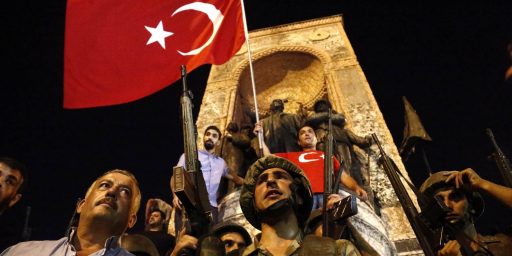Chávez Shutting Down Opposition TV Station
Cross-posted from PoliBlog:
Via the BBC: Venezuela court orders TV seizure:
Venezuela’s top court has allowed the government to take control of private TV transmitters as it prepares to replace commercial with state-run TV.
Radio Caracas Television, a station critical of the government, is being forced to stop broadcasting on its public frequency.
At a minimum, it is clear that Chávez has done a masterful job of capturing and shaping the institutions of the state to his liking.
Further, the move against RCTV is a means of exerting substantial control of the media so as to increase his national influence and thereby further consolidate the authoritarian nature of his regime. The elimination of the major televised opposition is clearly a boon for his ability to control what citizens hear and see and therefore a means by which to influence what they think.
RCTV is, it should be noted, is the oldest private television station in the country (its founding was in the 1953) and it is the most viewed channel in the country.
According to the AP:Opposition-aligned TV station to be taken off air in Venezuela
Chavez accuses RCTV of supporting a failed 2002 coup against him. RCTV has been accused of violating broadcast laws and showing programs with violence and sexual content that are morally degrading.
RCTV’s license is being reassigned to a public service channel, TVES, with the government providing start-up funds.
Chavez rejected allegations that his decision threatened freedom of expression.
“There’s no country in the world where there is so much freedom of expression,” he said.
There’s nothing quite like an authoritarian asserting how free something is as he is in the very act of restricting the freedom in question.
The problem with the charges against the station in regards to its behavior surrounding the coup attempt of 2002 is that it was almost five years ago. Even if the station could be credibly charged with improper or even illegal behavior at that time, it is rather late to use that as the reason for this move. Indeed, it is rather manifestly obvious that Chávez is simply further consolidating his own authoritarian regime by silencing his main critic.
And, as the AP notes, I am not the only one who thinks this to be true:
Human Rights Watch and Reporters Without Borders called the move a flagrant effort to silence criticism. The U.S. Senate Foreign Relations Committee on Thursday passed a bipartisan resolution condemning it.
Many Venezuelan journalists have taken to the streets in protest, but others side with the government.
Eleazar Diaz Rangel, editor of the newspaper Ultimas Noticias, argued that the “immense majority” of media organizations openly oppose the government. But pro-government channels dominate on TV. Globovision is the only other major opposition-aligned channel, and it is not seen in all parts of the country.



Reminds me of what has happened in Russia.
Russia? Forget that. Sounds to me like what is planned here in the states was the “fairness doctrine” gets revived.